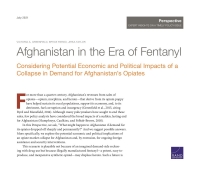Victoria A. Greenfield, Bryce Pardo, Jirka Taylor
Afghanistan is the world's largest producer of illegal opium poppy and is a key source for heroin markets across Europe and Asia. For decades, illegal opiates have helped sustain farmers and workers in rural Afghanistan while funding nonstate actors and insurgent groups. Although many policymakers have sought to end this illegal production, few policy analysts have considered the broad impacts of a sudden, lasting end for Afghanistan. Given the rise and dominance of fentanyl and other synthetic opioids as they displace heroin in major drug markets in the Americas, the authors assess what might happen to Afghanistan if demand for its opiates dropped off sharply and permanently. A rapid collapse in the opiate market in Afghanistan could have devastating effects on rural populations and be disruptive to other sectors and actors in the economy. A more gradual decline in demand for Afghan opiates could ease the transition by giving Afghan households and the economy more time to adjust, but it might still result in lower living standards in an already-poor country and add to migratory pressures. The authors discuss how a collapse of the market for Afghan opiates could unfold and what role the international community may need to play should it occur. The loss of demand for Afghan opiates could have significant impacts on economic and political conditions, depending largely on the pace of change.

No comments:
Post a Comment